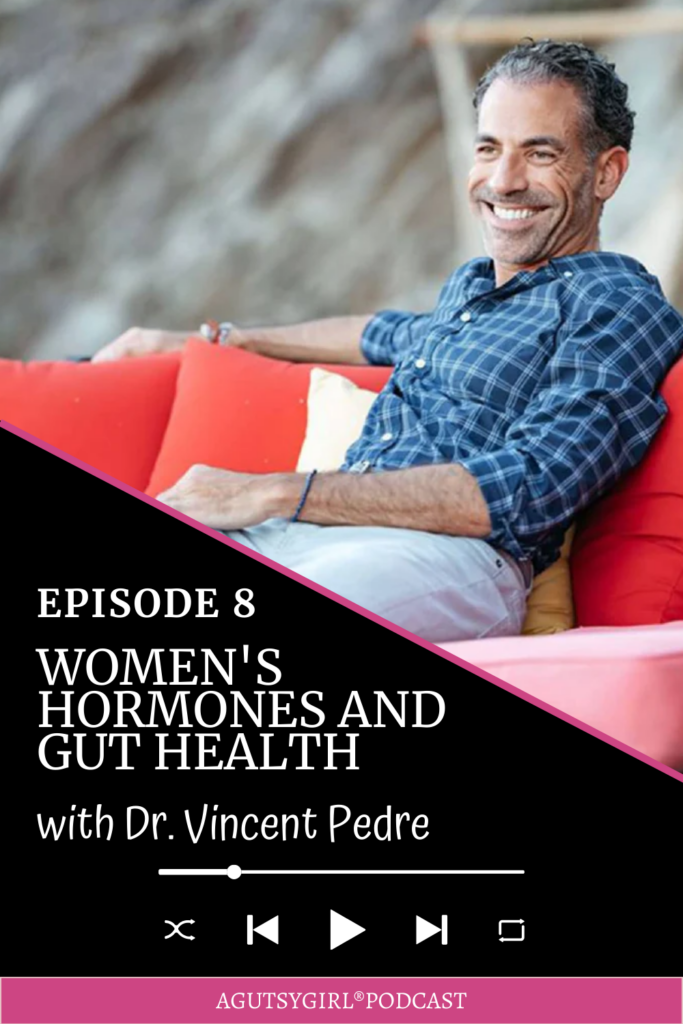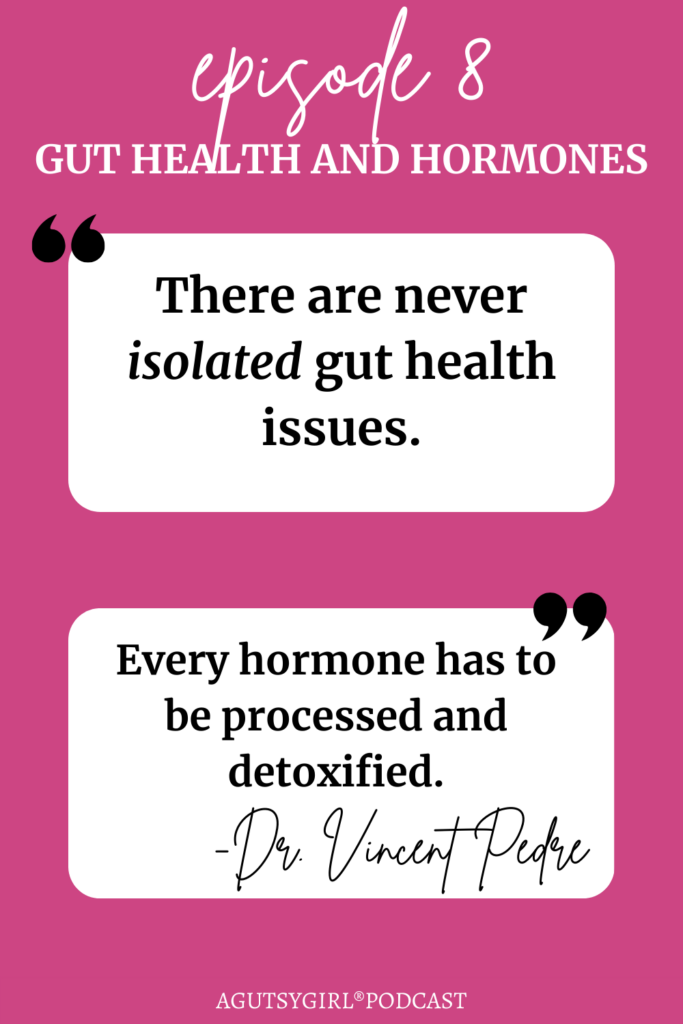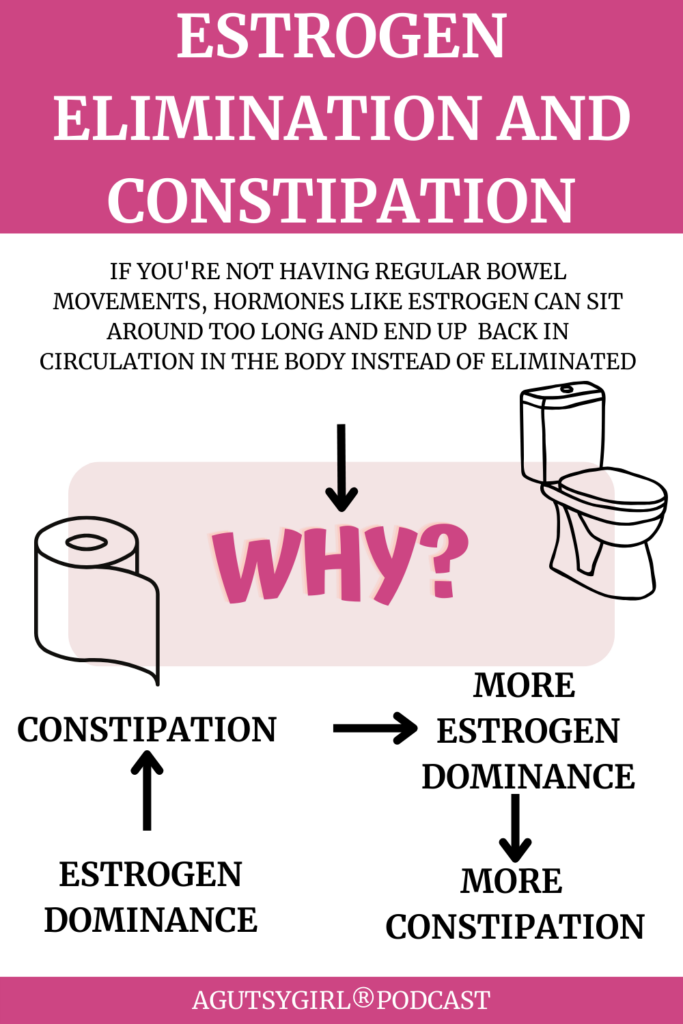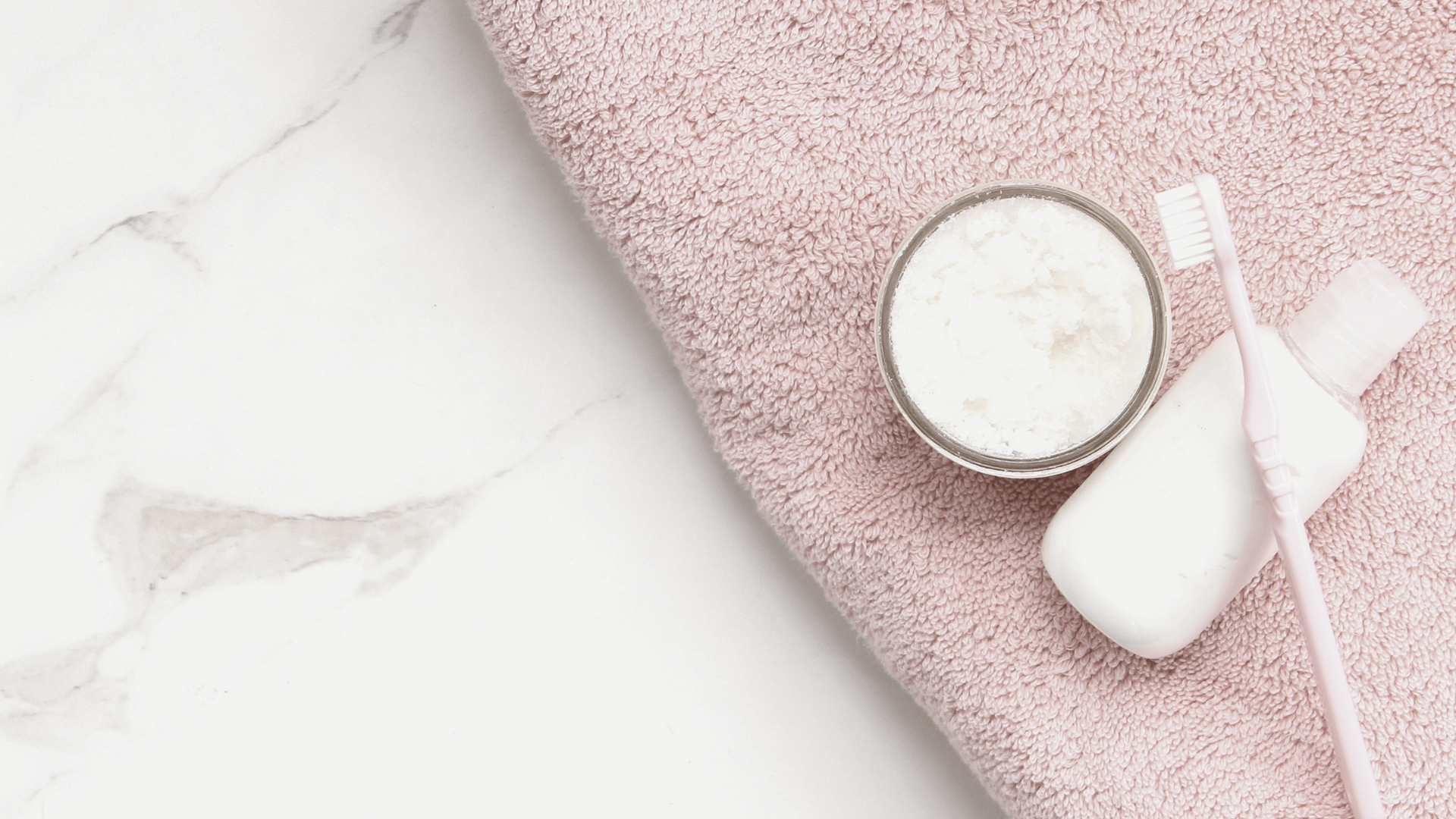Let’s welcome in Dr Vincent Pedre for Episode 8 of the A Gutsy Girl podcast.
Subscribe Today:
Apple Podcasts | Spotify | iHeart Radio | RSS
It will take you 5 seconds to rate and review the show HERE. Please do so that more women can find the show! I appreciate your help.
Episode 8: Dr Vincent Pedre {Gut Health and Hormones} Show Notes
Click HERE to save this episode’s post for later.

Resources Mentioned
- Dr. Pedre wrote an article for you that coincides with this podcast episode. You’ll find it below.
- “Practitioner Referrals” tab via The Master Gutsy Spreadsheet (Dr. Pedre added today)
- Parasympathetic vs. Sympathetic Nervous System
- Sleep and Gut Healing
- Endocrine Disruptors
- Happy Gut (Dr. Pedre’s book)
- Dr. Pedre on Instagram
- His Facebook page
- Dr. Pedre on TikTok
- Fight a Virus By Protecting Your Gut
- Vitamin D
Don’t Miss These Thoughts
- How Dr. Pedre became a doctor and what his own gut healing journey consisted of.
- “There are never isolated gut health issues.” – Dr. Pedre
- “Every hormone has to be processed and detoxified.”
- Dr. Pedre’s 3 pillars to detoxification
- Estrogen vs progesterone
- Majority of the gut microbiome lives in the large intestine.
- Top testing Dr. Pedre recommends.
- Dr. Pedre’s top 3 convictions around gut health and gut healing.
More from A Gutsy Girl
1. Welcome to A Gutsy Girl Podcast
2. Hang out on Instagram
3. BFF’s on YouTube
4. Resource: The Master Gutsy Spreadsheet
5. Rated-G Email Club
Btw – don’t forget to grab a copy of your 90-day healing journey journal (there is also a PDF e-version you can download today HERE).

Gut Health and Hormones [How They’re Connected + How to Keep Them Healthy]
The below is written by Dr. Vincent Pedre.
Dr. Pedre
Dr. Vincent M. Pedre is the Medical Director of Pedre Integrative Health and Founder of Dr. Pedre Wellness, nutraceutical consultant for NatureMD, and a Functional Medicine-Certified Practitioner in private practice in New York City since 2004.
He wrote the book, “Happy Gut”—which has helped thousands resolve their gut-related health issues.
Happy Gut
At first glance, it doesn’t seem like there’d be a strong connection between gut health and hormone health. I mean, they’re entirely different areas of the body, aren’t they? Actually, not so much. As a functional medicine doctor and the author of Happy Gut, I can tell you that they are actually more connected than you could possibly imagine.
In fact, I’d even go as far as to say that one can’t be healthy without the other. So whether you’re dealing with a hormone health issue or a gut health issue, the information below is critical to getting your health back.
The Gut-Hormone Connection
During our initial consultation, my 34-year-old patient Jennifer brought up a host of health issues that were making her feel less-than-optimal on a daily basis.
Over the past year, Jennifer had gained about 20 pounds and began suffering from irregular periods, frequent mood swings, and almost constant sugar cravings.
Her frustration was obvious and understandable.
After some testing, I was able to confirm that Jennifer had estrogen dominance, which is when there is too much estrogen circulating throughout the body over the course of the monthly menstrual cycle.
Estrogen isn’t inherently bad — in fact, it plays a key role in maintaining healthy skin, strong bones and muscle, heart health, brain and mental health, and reproductive health — but like all hormones, it’s important that it stays in balance with other hormones, like progesterone.
So where does the gut come into the picture? Well, gut health issues can actually be the underlying cause of high estrogen levels, which causes estrogen dominance and the all-too-common symptoms Jennfier and so many others experience.
Gut Dysbiosis and Estrogen Dominance
Dysbiosis occurs when there is a bacterial imbalance in the gut microbiome that allows “bad” bacteria to overgrow and crowd out beneficial probiotic organisms.
Dysbiosis has been connected to dozens of illnesses, including metabolic diseases like diabetes but also inflammatory and autoimmune diseases — and estrogen dominance is no exception.
When the gut microbiome is imbalanced, it can allow metabolized estrogen to be released and recirculate back into the body.
For example, studies have shown that when the gut is imbalanced, it can lead to a greater number of gut bacteria that produce beta-glucuronidase, an enzyme that actually REACTIVATES estrogen that has already been metabolized.
When these bacteria increase, estrogen also increases.
Researchers have even linked unhealthy microbiome alterations to estrogen-positive breast cancer.
Estrogen Elimination and Constipation
Another important link between hormones and gut health lies in the simple process of elimination (Yes, by that I mean pooping!).
If you’re not having regular bowel movements (you should be having at least one a day) hormones like estrogen can sit around too long and end up back in circulation in the body instead of eliminated.
Unfortunately, getting digestion moving again if you have estrogen dominance is easier said than done.
Why? Because ironically, estrogen dominance can cause constipation, which creates a self-perpetuating cycle of estrogen dominance —> constipation —> more estrogen dominance —> more constipation.
You can see how this could quickly snowball and be hard to reverse.
The good news is that by making smart and impactful lifestyle changes you can reverse the cycle and get your gut health and hormone health back on track.

Balance Hormones by Optimizing the Gut
By focusing on rebooting gut health and getting her digestion moving, Jennifer was able to rebalance her estrogen levels.
These days, she’s enjoying plenty of energy, regular periods, and has been able to maintain her weight.
So, how exactly did she get there? Balancing hormones by optimizing the gut can be a multi-step process, but here are a few key tips to get you started:
- Hydrate: Drinking more water can help keep digestion moving and prevent constipation. (You can join the Gutsy Girl hydration challenge here.)
- Reduce stress: Chronic stress has proven detrimental effects on gut and hormone health. I recommend daily meditation practice to help root yourself in the present moment.
- Eat fermented foods: Fermented foods contain beneficial bacteria that help rebalance the gut. Here’s how to get started with fermentation at home.
- Support detox: Properly detoxing estrogen is the key to re-balancing hormones. My HAPPY GUT® CLEANSE SHAKE is designed to support efficient detoxification and is formulated with a specific blend of nutrients to restore the gut.
- Ditch the sugar: Sugar is a known hormone-disruptor and it can increase inflammation in the gut, as well as allow sugar-eating bacteria to overgrow and crowd out beneficial probiotics. If you want better hormone balance through a healthier gut, try to eliminate sources of added and refined sugar in your life.
Health and Healing are All Connected
The gut and hormonal health systems might seem unrelated at first, but as you can see now, they couldn’t be more intricately connected.
The good news is that once you make these changes, you can reverse that negative cycle and turn it into a positive one.
As your gut health improves, your hormones improve, and as your hormone health improves, your gut health improves.
Pretty soon, you’ll be enjoying balanced moods, regular bowel movements, and radiant health that will have friends, family and coworkers stopping to curiously ask, “What are you doing differently?”!
Wrap Up
Time to wrap this up. As always, a huge goal for this show is to connect with even more people. Feel free to send an email to our team at podcast@agutsygirl.com. We want to hear questions, comments, show ideas, etc.
Did you enjoy this episode? Please drop a comment below or leave a review on Apple Podcasts.
Xox,
SKH
🤰 bloating be gone! weight loss through optimal gut health for women
💃ʜᴇᴀʟ ʏᴏᴜʀ ɢᴜᴛ. ʜᴇᴀʟ ʏᴏᴜʀ ʟɪfe.
🫶🏻 founder gutbyome.com






